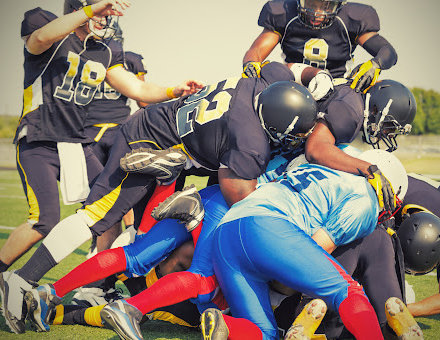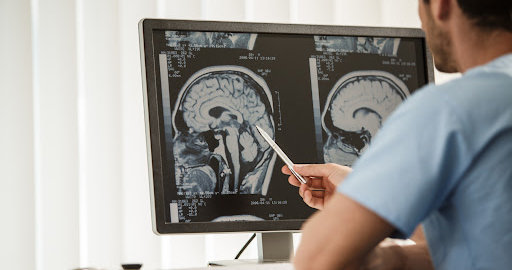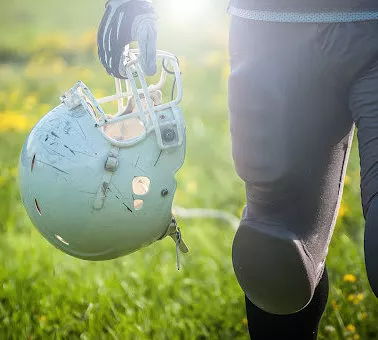Football Brain Injuries Lead to Long Term Issues

Football is so popular in the United States that it might have usurped baseball as “America’s pastime.” Especially in Louisiana, with the LSU Tigers, SU Jaguars, Saints, and more, football is the sport that’s guaranteed to be on TV sets around the state come fall.
However, football can also be dangerous: even with all the padding and helmets that players wear, it’s a full-contact sport with more than its fair share of associated injuries. Players regularly suffer torn ligaments, broken bones, and of course, concussions.
Recent research has shown that frequent brain damage, even if relatively minor, can lead to a deadly neurodegenerative condition known as chronic traumatic encephalopathy, or CTE. While much is still unknown about CTE, this serious condition has football fans, players, and coaches worried and calling for reforms to the game.
Just what do we know about CTE? And how does brain injury work in football, both collegiate and professional? If you or a loved one might have CTE, get in touch with an experienced lawyer who can help you hold those responsible for your injuries accountable for your actions.
How Can Football Cause a Brain Injury?
As a full-contact sport, football is a strong risk factor for long-term concussion symptoms. The Centers of Disease Control and Prevention (CDC) estimate that nearly three million people suffer a concussion in the U.S. each year. In 2020, about 176 people a day died from concussions and other more serious traumatic brain injuries (TBI).
While TBI affects people of all ages, genders, and ethnicities, athletes are especially at-risk for brain injuries. Concussions are mild traumatic brain injuries that occur when the head is impacted by major force, which results in a minor brain injury.
In football, those brain injuries can occur during training and regular gameplay. Tackling, sacking, falling on the field, and just colliding can all lead to concussions and more serious traumatic brain injuries while playing football.
Over time, minor brain injuries compound, and can eventually lead to chronic traumatic encephalopathy, a much more serious condition.
History of CTE

CTE was originally studied in the 1920s as “punch-drunk syndrome,” due to the similarity of CTE’s symptoms with those of drunkenness. Boxers exhibited many of the symptoms of CTE due to their repeated head trauma from punches, which is how the second name for the condition got its name. Dementia pugilistica, or “fighter’s dementia,” was coined in 1937, and the condition was further studied as related to that sport.
The link between CTE and American football wasn’t established until the early 2000s, after Mike Webster died after exhibiting unusual behavior. After other players died in similar circumstances, doctors studied their conditions more thoroughly and found CTE in the brains of dead players.
Since then, other people have been found to be prone to CTE injuries:
- Contact sports players, such as soccer football, wrestling, MMA, hockey, and rugby
- Military personnel, due to repeated exposure to concussive forces
- Domestic violence victims
- People who bang their head repeatedly
CTE Diagnosis
Concerns over CTE resulting from football only truly began in the 1990s, so it’s still not well-understood as a condition. As a result, a CTE diagnosis can only be definitively found in a post-mortem autopsy.
However, because CTE is such a serious condition, and possibly extremely common, research is ongoing into this disease. In fact, a 2017 study by Boston University tested deceased football players’ brains for CTE, and found the following disturbing facts:
- 99% of NFL players tested positive for CTE
- 64% of semi-professional footballers had CTE
- 91% of college football players tested positive
- 21% of high school football players had various stages of CTE
These truly disturbing statistics highlight the dangers of CTE in all levels of the sport, and beg the question as to what safety measures are being taken to protect players. Sadly, the NFL has been dragging its feet on admitting CTE is a problem, and while there have been some improvements to helmets and other football safety equipment, many experts believe those improvements simply don’t go far enough.
Chronic Traumatic Encephalopathy (CTE) Symptoms
While a diagnosis can’t be definitive while the patient is alive, there are symptoms of CTE that can help lead to a possible diagnosis and treatment.
- Personality changes, including irritability, aggression, anxiety, apathy, depression, and loss of impulse control
- Parkinson’s disease or similar tremors
- Loss of memory and dementia
As best as doctors have been able to determine, CTE is not reversible or curable. Some of the above symptoms can be treated, but until we know more about the disease itself, those treatments are stopgaps.
This is why it’s so important to continue research into CTE, and why it’s important to make sure CTE victims are given the palliative care they need for a decent quality of life. Quality care costs money, for doctor’s visits, in-home care, medication to combat the worst symptoms of CTE, and other costs.
While NFL players and other professional athletes may be able to foot the bill, many other victims of CTE may not be able to. That’s why hiring an experienced legal professional to help you or your loved one secure the funds you need to live your life is so important.
Recovering Damages from a Football Brain Injury

If you’ve suffered multiple concussions or traumatic brain injuries due to playing football or another sport, you could be experiencing a greatly diminished quality of life. CTE symptoms can take years or even decades to present, and sometimes they can look like Alzheimer’s disease or other related forms of dementia.
If you think you may have CTE, make an appointment with a doctor to discuss your symptoms. If your brain damage was caused by coaches, other players, or the league you played with, you could be entitled to financial compensation from one or all of those entities. An experienced brain injury lawyer will be able to help you navigate the complex legal landscape.
Gordon McKernan Injury Attorneys are experienced personal injury lawyers specializing in sports injuries and athletic brain injuries. Give us a call today at 888.501.7888 for a free consultation about your brain injury claim. We can help with the discovery process, negotiating with insurance companies for fair compensation, and even taking your case to court. Plus, we’ll charge you nothing until we win your case: that’s the G Guarantee.

